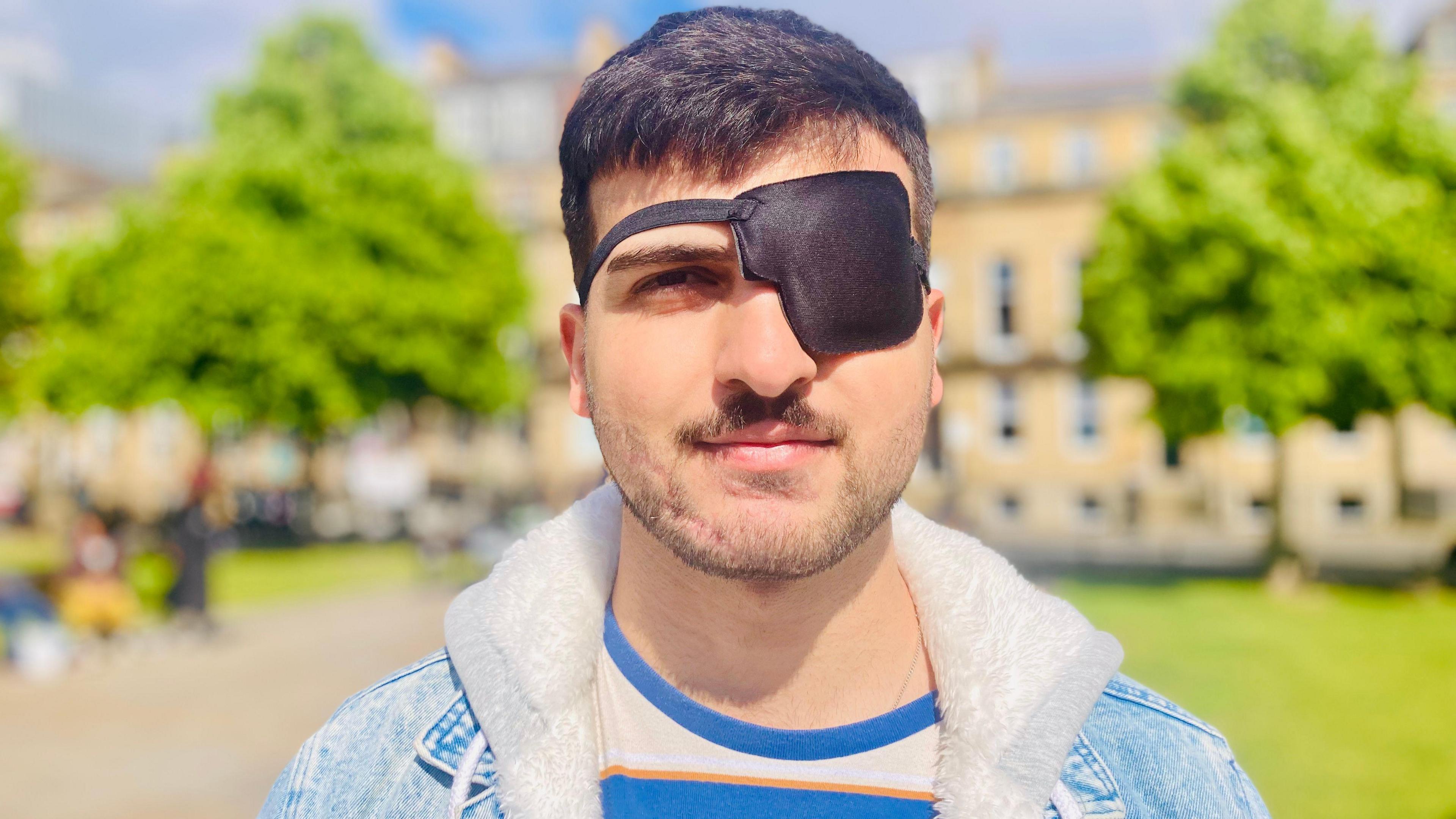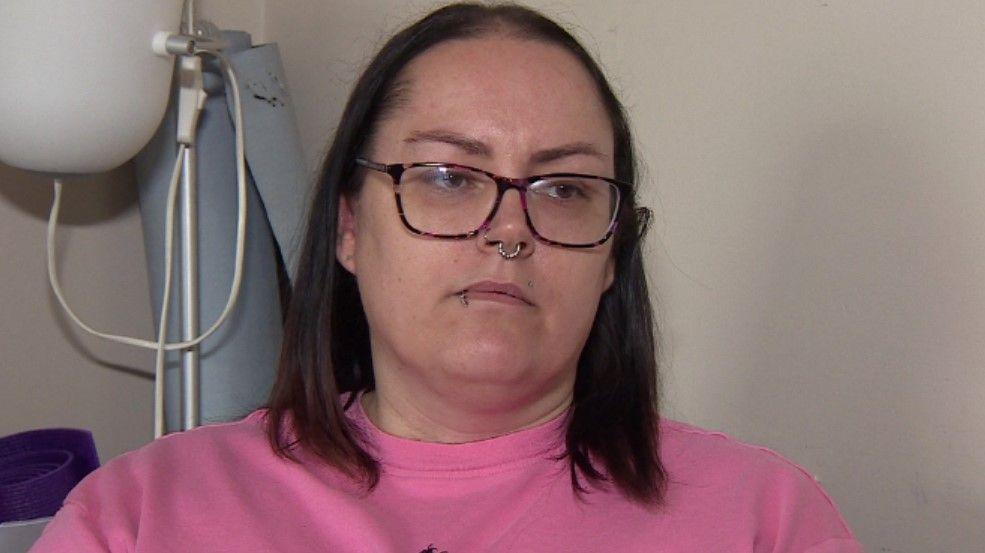'I’ve been waiting three years for surgery'

Jabar Barzanji, 23, from Newcastle, lost an eye in a car crash that killed his parents when he was a teenager
- Published
In the run-up to the general election, the BBC is looking at the issues that matter the most to you, as part of Your Voice, Your Vote. One theme has been waiting lists for NHS treatment. BBC Look North's health correspondent Sharon Barbour took to the streets of Newcastle to hear people's experiences.
Jabar Barzanji is "desperate" to have eye surgery.
"Initially I had a couple of surgeries that took place within a few months," he says, "but the last one, I’ve been waiting for three years."
The 23-year-old, from Newcastle, lost his left eye in a car accident, in which his parents died, when he was a teenager.
He was seriously injured and wears a patch as he waits for an implant.
"I don’t know what caused this long wait," he says.
"It’s not a day or two, or months, or a year, or two years. Especially for someone like myself at such a young age, it’s just difficult."
Jabar says because he wears an eyepatch, people make assumptions.
"I do wear a prosthetic eye, it causes pain because the implant is not suitable, it can cause inflammation, so I wear a patch," he explains.
He says the situation has also had a negative affect on his mental health.
Jabar, who works full-time and has plans to to university, says he hopes to have his surgery in the next few months.
In the past he has considered going abroad for treatment, but says it was too expensive.
He says he wants the next government to speed-up appointments.
Jabar is not alone. With so many waiting for treatment, I took my chances to just go out on the street in Newcastle city centre and see what experiences people were having - and they wanted to talk about it.
Within minutes, I was hearing stories of "a year wait to get see a hospital dentist". Others told of long waits for surgery. One man said he had been waiting four years for a hernia operation. Those with cancer had been seen quicker.
Some spoke about taking desperate measures to get treatment, of going overseas - but fearful of something going wrong - or going private.
Across England, the waiting list for treatment hit 7.57 million at the end of April, up from 7.54 million the previous month.
More than 300,000 waits have been for longer than a year, according to NHS figures.
It will be one of the biggest challenges for the next government.
Siva Anandaciva, of health think-tank the King’s Fund, says the figures show the NHS is under "incredible pressure".
"We are seeing performance challenges that would have been unfathomable 10 years ago," he explains.
"It’s no surprise the NHS is again at the top of many polls on what matters most to voters, as we head towards a general election."
NHS England medical director, Professor Sir Stephen Powis, says demand across the board remains high.
He warns the five-day strike by junior doctors at the end of June is likely to cause "further disruption".
There are differences in wait times.
The North East and North Cumbria Integrated Care Board says: "We are currently the best performing ICB region in the country for people receiving treatment within 18 weeks from referral."
It says there has been significant progress in addressing the backlog.
Across the North East and Cumbria, 355,660 people are on the waiting list, as of March.
But there are differences in wait times depending on what you are waiting for.
Those needing heart treatment are seen more quickly - about nine weeks for cardiology services – compared to an average 14-week wait for plastic surgery, trauma and orthopaedic services.
Ann Hope, from Billingham, was diagnosed with acute myeloid leukaemia.
The 44-year-old has had her cancer treatment, but damage from chemotherapy has left her with pain in her legs. She has been waiting for that to be treated since January.
"It’s like pins and needles permanently," she says.
She says she is sensitive to a lot of the drugs doctors have tried to treat it.

Ann Hope has been waiting for pain-relief treatment following chemotherapy
In January, she was offered a new treatment. The only problem was she would have to wait - and she has been waiting since.
Ann has been told the wait for pain relief will be until September.
The pain leaves her struggling to do even the most basic things.
"I used to be able to run 10k, now I can’t walk up the stairs sometimes," she says.
"A lot of people look at me and they don’t see the pain, because I try and hide it – especially from the children."
She says the waiting list will be the main factor in her decision at the ballot box.
"The NHS is definitely a big priority for who I am going to vote for.
"The waiting list times, especially for things like this are unbelievable, and things need to be sorted very quickly."
How will the parties tackle waiting lists?
Labour is promising to deliver an extra 40,000 operations, scans and appointments a week in England, and double the number of cancer scanners.
The Conservatives say they will recruit 92,000 extra nurses and 24,000 extra doctors, and invest in new NHS facilities.
The Liberal Democrats would guarantee all cancer patients would start treatment within 62 days of an urgent referral – recruit more cancer nurses, and replace old scanners.
The Green Party wants to increase funding of the NHS to £50bn by 2030, and says it will increase the salaries of frontline workers.
Reform UK has called for a new NHS funding model; looking to countries like France, which have insurance-based health models. The party sets out an extra £17bn a year for the NHS.
Follow BBC North East on X (formerly Twitter), external, Facebook, external and Instagram, external. Send your story ideas to northeastandcumbria@bbc.co.uk.


